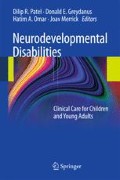Abstract
Assessment of patients diagnosed with developmental disabilities requires the clinician to understand that presenting problems are the culmination of a complex array of contributing factors. Development is influenced by biological, neurological, cognitive, and psychosocial factors, as well as their contributions to the functioning of the patient. Neurodevelopmental challenges specifically impact the growth and maturation of the nervous system and these interactions within an individual. Psychological assessment can often assist the medical provider through a more comprehensive investigation of these various factors. In particular, assessments focused on neuropsychological functioning in children with neurodevelopmental disorders can assist care providers in understanding how the individual patient’s functioning is impacted and can provide suggestions on how the environment must be adapted to allow the patient to navigate the maturation process with obstacles minimized and function maximized.
Access this chapter
Tax calculation will be finalised at checkout
Purchases are for personal use only
References
Pratt HD, Patel DR, Greydanus DE. Sports and the neurodevelopment of the child and adolescent. In: DeLee JC, Drez DD, Miller MD, editors. Orthopaedic sports medicine. 2nd ed. Philadelphia, PA: WB Saunders; 2002. pp. 624–43.
Pratt, HD. Neurodevelopmental Issues in the assessment and treatment of deficits in attention, cognition, and learning during adolescence. Adolesc Med. 2002;13(3):579–598.
Capute AJ, Accardo PJ. A neurodevelopmental perspective on the continuum of developmental disabilities. In: Capute AJ, Accardo PJ, editors. Developmental disabilities in infancy and childhood. 2nd ed. Baltimore, MD: Paul H Brookes; 1996. pp. 1–24.
Caterino MC. Age differences in the performance of basketball dribbling by elementary school boys. Percept Mot Skills. 1991;73:253–4.
Dixon SD, Stein MT, editors. Encounters with children: pediatric behavior and development. 3rd ed. Philadelphia, PA: Mosby; 2000.
Dyment PG. Sports and the neurodevelopment of the child. In: Stanitski CL, DeLee JC, Drez DD, editors. Pediatric and adolescent sports medicine. Philadelphia, PA: WB Saunders; 1994. pp. 12–15.
Finch CF, Elliott BC, McGrath AC. Measures to prevent cricket injuries: an overview. Sports Med. 1999;28(4):263–72.
Lews BJ. Structuring movement experiences for pre-school children. Child Care Health Dev. 1978;4:385–95.
Linder MM, Townsend DJ, Jones JC, et al. Incidence of adolescent injuries in junior high-school football and its relationship to sexual maturity. Clin J Sports Med. 1995;5:167–70.
Patel DR, Greydanus DE, Calles JL Jr, Pratt HD. Developmental disabilities across the lifespan. Dis Mon. 2010;56(6):299–398.
World Health Organization. Towards a common language for functioning, disability and health: the international classification of functioning, disability and health. Geneva: WHO; 2002.
Bricher G. Disabled people, health professionals and the social model of disability: Can there be a research relationship? Disabil Soc. 2000;15(5):781–93.
Anastasi A. Psychological testing. 6th ed. New York, NY: Macmillan; 1988: p. 23.
American Psychological Association. American psychological association ethical principles of psychologists and code of conduct. Washington, DC: APA; 2002.
Spies RA, Carlson JF, Geisinger KF, editors. The eighteenth mental measurements year book. Nebraska: University Nebraska Press; 2010.
AERA, APA, NCME. Standards for educational and psychological testing. Hanover: Sheridan Press; 1999.
American Psychiatric Association. Diagnostic and statistical manual of mental disorders. 4th ed. Text revision. Arlington, VA: APA; 2000.
Author information
Authors and Affiliations
Corresponding author
Editor information
Editors and Affiliations
Rights and permissions
Copyright information
© 2011 Springer Science+Business Media B.V.
About this chapter
Cite this chapter
Larsen, M.A., Berglund, E.T., Joseph, R., Pratt, H.D. (2011). Psychological Assessment and Testing. In: Patel, D., Greydanus, D., Omar, H., Merrick, J. (eds) Neurodevelopmental Disabilities. Springer, Dordrecht. https://doi.org/10.1007/978-94-007-0627-9_3
Download citation
DOI: https://doi.org/10.1007/978-94-007-0627-9_3
Published:
Publisher Name: Springer, Dordrecht
Print ISBN: 978-94-007-0626-2
Online ISBN: 978-94-007-0627-9
eBook Packages: MedicineMedicine (R0)

